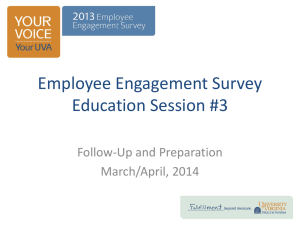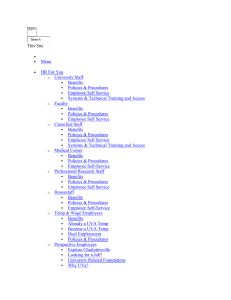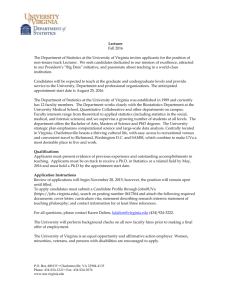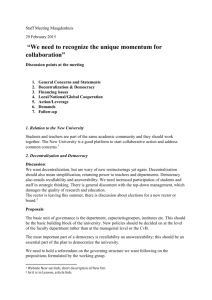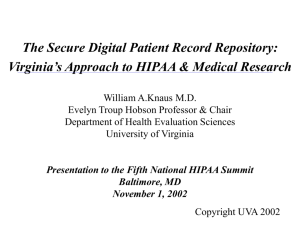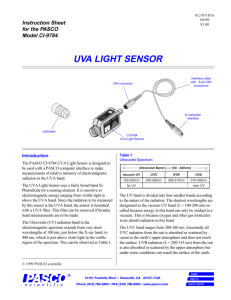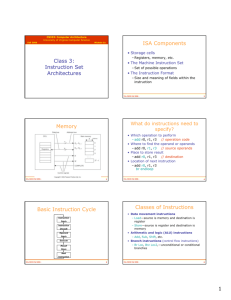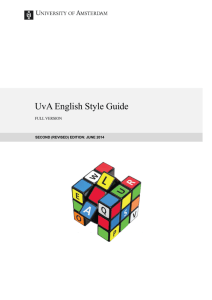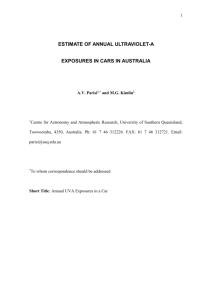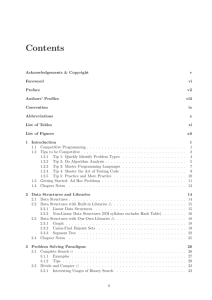2011 Presenter Bios
advertisement
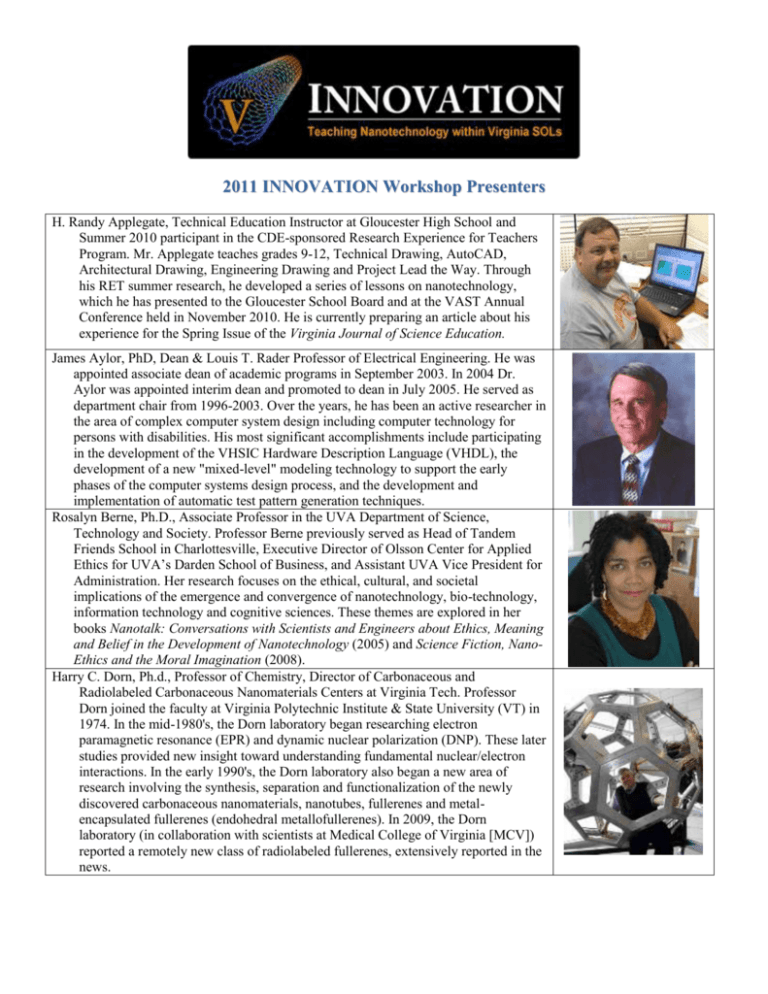
2011 INNOVATION Workshop Presenters H. Randy Applegate, Technical Education Instructor at Gloucester High School and Summer 2010 participant in the CDE-sponsored Research Experience for Teachers Program. Mr. Applegate teaches grades 9-12, Technical Drawing, AutoCAD, Architectural Drawing, Engineering Drawing and Project Lead the Way. Through his RET summer research, he developed a series of lessons on nanotechnology, which he has presented to the Gloucester School Board and at the VAST Annual Conference held in November 2010. He is currently preparing an article about his experience for the Spring Issue of the Virginia Journal of Science Education. James Aylor, PhD, Dean & Louis T. Rader Professor of Electrical Engineering. He was appointed associate dean of academic programs in September 2003. In 2004 Dr. Aylor was appointed interim dean and promoted to dean in July 2005. He served as department chair from 1996-2003. Over the years, he has been an active researcher in the area of complex computer system design including computer technology for persons with disabilities. His most significant accomplishments include participating in the development of the VHSIC Hardware Description Language (VHDL), the development of a new "mixed-level" modeling technology to support the early phases of the computer systems design process, and the development and implementation of automatic test pattern generation techniques. Rosalyn Berne, Ph.D., Associate Professor in the UVA Department of Science, Technology and Society. Professor Berne previously served as Head of Tandem Friends School in Charlottesville, Executive Director of Olsson Center for Applied Ethics for UVA’s Darden School of Business, and Assistant UVA Vice President for Administration. Her research focuses on the ethical, cultural, and societal implications of the emergence and convergence of nanotechnology, bio-technology, information technology and cognitive sciences. These themes are explored in her books Nanotalk: Conversations with Scientists and Engineers about Ethics, Meaning and Belief in the Development of Nanotechnology (2005) and Science Fiction, NanoEthics and the Moral Imagination (2008). Harry C. Dorn, Ph.d., Professor of Chemistry, Director of Carbonaceous and Radiolabeled Carbonaceous Nanomaterials Centers at Virginia Tech. Professor Dorn joined the faculty at Virginia Polytechnic Institute & State University (VT) in 1974. In the mid-1980's, the Dorn laboratory began researching electron paramagnetic resonance (EPR) and dynamic nuclear polarization (DNP). These later studies provided new insight toward understanding fundamental nuclear/electron interactions. In the early 1990's, the Dorn laboratory also began a new area of research involving the synthesis, separation and functionalization of the newly discovered carbonaceous nanomaterials, nanotubes, fullerenes and metalencapsulated fullerenes (endohedral metallofullerenes). In 2009, the Dorn laboratory (in collaboration with scientists at Medical College of Virginia [MCV]) reported a remotely new class of radiolabeled fullerenes, extensively reported in the news. Lisa Friedersdorf, Ph.D., Managing Director of the UVA Institute for Nanoscale and Quantum Scientific and Technological Advanced Research (nanoSTAR) and a Research Program Manager in the Office of the Vice President for Research and Graduate Studies at the University of Virginia. She has been involved in nanotechnology research and development for more than fifteen years. In her role as Research Program Manager, Lisa is actively engaged with several state-wide research and development activities and organizations including the Virginia Research and Technology Advisory Commission (VRTAC) and the Virginia Coastal Energy Research Consortium. Jerry Floro, Ph.D., Associate Professor, Department of UVA Materials Science & Engineering. Professor Floro joined the UVA faculty in 2006, and from 1994-2006 he worked at Sandia National Labs. His research engages many aspects of thin film growth, with a current focus on self-assembly at the nanoscale. His research also investigates the growth and manipulation of nanoparticles, and their use to study a variety of fundamental issues in nanoscience. He also serves as coordinator of the annual NanoDays outreach event for the public. NanoDays is a nationwide public outreach event organized by NISE, the Nanoscale Informal Science Education Network. UVA, the NanoDays open house each March consists of videos and slide shows, posters, laboratory tours, and several hands-on demonstrations. Eileen Malick is a Computer Science Teacher at Atlee High School in Mechanicsville, VA. She teachers grades 9-12 in courses such as Visual Basic, C++, Java Programming, and IT for a Global Society. She also serves as an Engineering Camp Director for Elementary and Middle School students, sponsor for the FIRST Robotics Team 1599, and Video Game Programming Camp director. She is a MathScience Innovation Center (MSiC) 21st Century Fellow of both the Nanotechnology and the Fractals Program. She was a participant of the April, 2010 UVA Innovation Workshop. Pamela Norris, PhD, is the Frederick Tracy Morse Professor of Mechanical & Aerospace Engineering. She joined UVA in the Fall of 1994. She is the founder and director of the U.Va Microscale Heat Transfer Laboratory and the Aerogel Research Lab. Her research interests include: sensors for biological warfare detection, optical measurement techniques, microscale heat transfer, thin-film thermophysical properties, advancement of aerogel technology. The Aerogel Research Lab is active in aerogel production and material modification techniques, flow characterization studies, acoustic studies, and in the development of biological warfare sensors. Brooks Pate, PhD., William R. Kenan Jr. Professor of Chemistry at UVA. The Pate laboratory studies vibrational dynamics and the spectroscopy of highly excited molecules. Professor Pate studies the kinetics of energy flow in isolated molecules and molecules in solution. He has developed a new type of molecular spectroscopy called dynamic rotational spectroscopy to study isomerization reactions of isolated molecules. The lab group’s second area of research is the vibrational dynamics of molecules in dilute solution. The goal for solution phase studies is to understand how solvent molecules modify the dynamics and reactivity of the isolated molecule. Nathan Swami, Ph.D., Graduate Program Director and Associate Professor of UVA Department of Electrical and Computer Engineering. He joined the UVA faculty in 2004, after a having served as the director of the statewide nanotechnology initiative. At UVA he teaches courses in semiconductor devices, directs the ECE graduate program, and conducts research in the area of molecular and bioelectric devices. His research group aims to develop molecular and bioelectric devices for guided selfassembly, signal transduction, sensing, and modulation of magnetic moments or charge. These paradigms may be applied within implantable biomaterials, microfluidic biomolecular devices, and nanoelectronic devices for purposes of tissue regeneration and molecular or environmental sensing.
